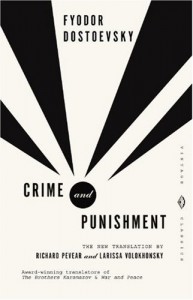Ironic Contradictions
Crime Of The Heart = Punishment Of The Mind

I read Crime and Punishment while away on my holiday and forgot (what a crime) to include a review for it here. So here is my review for Crime and Punishment.
Crime and Punishment is one of those quintessential classics that every reader of literature knows they must read at some point in their life. There is a clear reason for this, for Crime and Punishment is one of the greatest novels of its type in existence that I have encountered.
There are certain types of authors who seem to understand various issues better than others. Charles Dickens for instance, is the example of an author who understands the pressures of life and the ways in which society can tread upon individual freedoms in the pursuit of wealth. Similarly, many of the great Russian authors seem to understand suffering and poverty like few other authors can. But where a man like Anton Chekhov utilises the simplicity of language to devastating effect, Fyodor Dostoyevsky wields his pen to talk about suffering on a holistic level.
In essence, Crime and Punishment is perhaps the greatest example of how to write a novel about psychological suffering. For within the novel you have the great cat and mouse game between detective and criminal, yet it is the mind of the criminal of which we are aware. We see his uncertain reasoning regarding the murderous act. We see his insecurity regarding his family and their romantic endeavours. We see his apparent confidence reduced to a series of internal struggles and we see him struggle to maintain a human façade when faced with inquisitive interrogators. In so many ways, the whole act is built up, stage by stage, to show in devastating clarity a criminal who does not believe himself to be a criminal.
Do we not all justify ourselves and our lives every time we are challenged? Who among humanity would willingly and happily accede that they are a criminal, or guilty of a wrong act - a kind of treachery? Very few would, and those that would we would name as insane in some manner. Therefore to see the main character, Raskolnikov, go through such a process of reinterpreting, re-evaluating and re justifying his deeds, is to gain an insight into the act of being human. And that is a terrifyingly brilliant thing.
There is something other than the psychological intrigue which plays across this book. To the open reader there are many religious and spiritual themes regarding the existence of god, the afterlife and what it is to be mortal. Raskolnikov at points, clearly denies a belief in any god and this lines up with the pantomime he lives out in everyday society. For to accept that any god could exist is to accede that he has committed a crime not merely to society but against a human soul and therefore against a godly creator. However, the story of Lazarus, the man raised from the dead, becomes a kind of metaphor in this story, for the spiritual condition of Raskolnikov and at the conclusion of Dostoyevsky's narrative there are signs that Raskolnikov's spiritual life is being resurrected.
In the end Dostoyevsky's work is so multifaceted that it may take several readings and re-readings to get just a small hint of what he suggests in it. The fact that this is such an open novel is what makes it a great work of fiction and one I am certain to return to in my lifetime for new insights.



 6
6
 4
4
